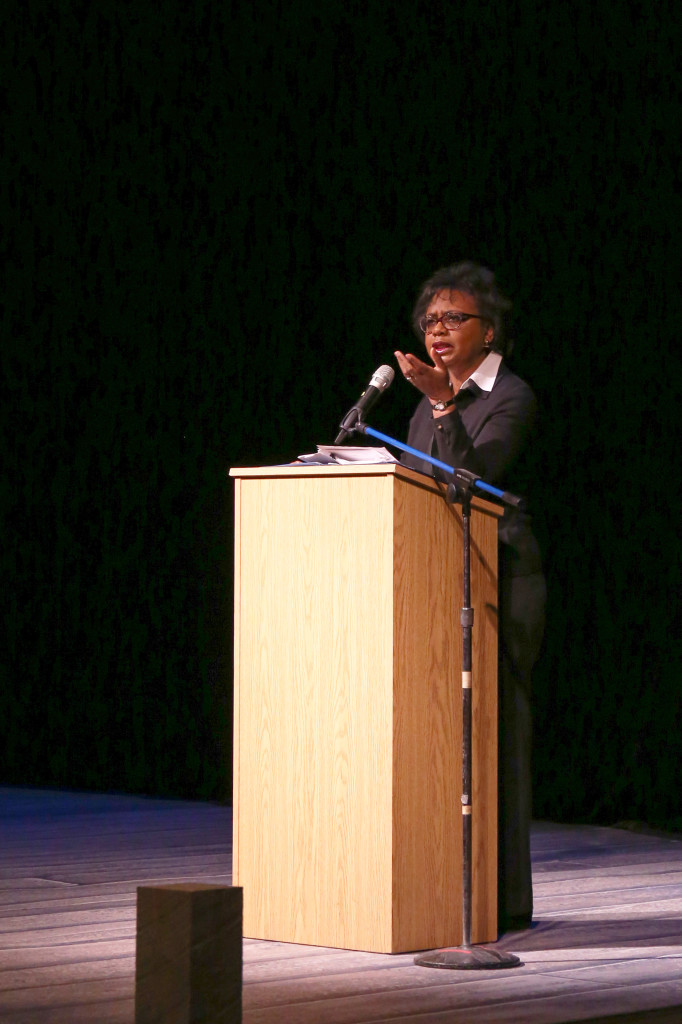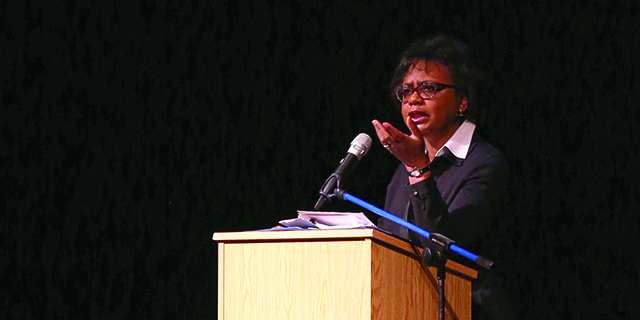
Anita Hill speaks to the Fieldston community at the Gender assembly
“Change has never been made because a majority wanted it,” said Anita Hill at the Gender assembly on February 19. “It has been made because a few people passionately pursued their dream of a just world.”
Last Thursday the Upper School congregated in the auditorium to hear Anita Hill speak about two important social identifiers: race and gender. After giving a speech detailing her thoughts as a black feminist, Ms. Hill answered several questions regarding intersectionality, gender issues, and her experiences as the primary testifier against Judge Clarence Thomas during his Supreme Court confirmation hearing. It was gratifying to see that both male and female students lined up to ask Hill questions during the Q & A session. As Hill thoughtfully answered each of the queries, it became clear that she is an impassioned woman who ardently defends her beliefs. Her spirited presence and inspiring words radiated through the auditorium, making this week’s assembly a phenomenal success.
Anita Faye Hill is an American attorney and an academic. She is currently a professor of women’s studies, social policy and law at Brandeis University. Hill became the face of the feminist movement in 1991 when she accused U.S. Supreme Court nominee Clarence Thomas of sexual harassment. During Thomas’ hearing, Hill’s credibility was frequently questioned. The right wing threw derogatory and often contradictory allegations in her direction. The Senate Judiciary Committee treated her as if she were on trial, referring to her as delusional and “scorned.” The press, who only further exacerbated the situation, parroted these sentiments. In retrospect, one can easily see that nepotism prevailed throughout the trial. Despite Hill taking a polygraph test to support the veracity of her statements and four other women who were willing to testify, Thomas was ultimately confirmed to the Supreme Court. Today, Anita Hill’s trial has become a symbol for the implicit racial and sexist biases which are still present within the judicial system today. Hill was invited to speak at the assembly as a continuation of the conversation sparked by the screening of the 2013 film, Anita, and the recent discourse started in the Women’s Leadership club at Fieldston.
During her speech, which detailed her involvement in the trial, Hill broke down her situation into three distinct issues: an issue of sexual harassment, an issue of judicial representation, and an issue of political representation. She pointed out that at the time of the trial the judicial representation was overwhelmingly male and most of its constituents were Caucasian and upper class. As a black female Hill found it hard to relate to anybody on the judicial committee, making it even harder to present her case. In fact she found it almost laughable that “issues of race and gender were being primarily mediated by rich, white, men”. Hill went on to highlight some important questions, which were raised by the trial: “How do we deal with sexual violence? How do we deal with race and gender? How do we deal with who decides the value of an opinion? How do we deal with the consequences of abusive behavior?” After giving a short yet insightful speech, Hill gladly opened the floor to questions from students.
Within seconds, a long line of students formed at the microphone. Questions ranged from current social and political issues to inquiring about Hill’s thoughts on the trial. One of the first questions was about her opinions on Joe Biden as our Vice President. Biden presided over the hearings in 1991 and was widely criticized by liberal legal advocates and women’s groups for having mismanaged the allegations made by Hill. Her initial response was, “Well whenever somebody asks if I voted for Obama/Biden, I say no, I voted for Obama”. Hill then went on to say that, “…as Vice President, Joe Biden now has the opportunity to redeem himself. He is involved in feminist movements and, despite his rulings during the trials, participated in the passing of Title 9. Still, Joe Biden has a lot of work to do to make up for what happened after 1991.”
The next two questions hit closer to home, when two girls asked how to help friends who were victims of sexual abuse/harassment and how to handle street harassment. After a few brief seconds of silence, Hill responded thoughtfully. To the first question she said, “You need to be a friend first. Let them know you believe in them, you believe in their worth. Because that is the first thing you question after something like that happens to you. The next thing to do is to help them get informed. Find out about the processes to go about coming forward. The last thing, and the hardest, is to allows the friend to decide what is best for them and supporting their decision no matter what.”
To the second question Hill responded, “Do what is the safest for you in that moment, which might not always be something confrontational.” After being asked about her thoughts on the Bill Cosby allegations and media coverage over the years, Hill replied, “In 1991, the judiciary committee ignored 4 women who were willing to testify and labeled the trial as a “he said/she said”. The coverage of women’s stories has definitely improved; it has become more objective. The reporting has changed since my trial.” One of the last questions was whether she would change anything in hindsight. Hill nodded and paused slightly before answering. “Honestly, I wouldn’t do anything differently. The only thing I ever regret were the people who got hurt in the process.”
Hill left the podium with a brief final remark: “…I knew that at any moment, they [judiciary committee] would be looking for me to have a meltdown, and use it to discredit me. I was there to tell my story. There were times I could have been clearer but I did my job, they did not do theirs…” Her concluding statements met with hearty applause from the students and teachers.
The Anita Hill assembly was received extremely well by the Fieldston community. Danielle Cohen (VI), one of the co-leaders of the assembly and an active member of the Women’s leadership club, said “I thought Anita Hill was fantastic. She really is a young role model for women…” Paulina Bahary (VI) said, “I was surprised by how how tone of voice wasn’t blatantly emotional, considering all the hardships she faced. Instead, she was full of power and motivation.” Zoe Sf (VI) added, “Although the assembly was great, we should have had discussion sessions after. I feel like people definitely had more to say.”
The assembly did pave the way for a larger discussion about gender and female empowerment in the Fieldston community, especially in light of the recent proposal for a gender mandate for the FSG presidency. Bahary said, “I think Fieldston should try to do more. Since there has been a lack of representation of female leaders, we need that extra push to even things out…I was shocked by the fact that only 17 percent of men voted for the mandate.”
When asked what his thoughts were on empowerment at Fieldston, Schuyler Roos (VI) responded, “I can’t say we’re doing enough for empowerment of women, there’s no such a thing as doing enough. I’m not sure how I feel about the gender mandate for student body, but it’s an example of the kind of things Fieldston should consider.” Cohen notes that “The women’s leadership program has been attempting to reach out to the community via roundtables….with the FSG mandate discussion, there was more gender representation…but when male privilege is being questioned, that’s when people show up.”
From student opinion, it is clear that although we are lucky to be part of a community, which encourages such discussion, there is still much work for us to do with regards to female empowerment. The Hill assembly motivated students to think critically about their roles at Fieldston. Inspiring speakers and active dialogue are two small but important steps towards achieving the inclusive society that Anita Hill and many other like her envision.






